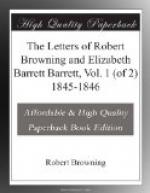Out comes the sun, in comes the Times and eleven strikes (it does) already, and I have to go to Town, and I have no alternative but that this story of the Critic and Poet, ‘the Bear and the Fiddle,’ should ‘begin but break off in the middle’; yet I doubt—nor will you henceforth, I know, say, ’I vex you, I am sure, by this lengthy writing.’ Mind that spring is coming, for all this snow; and know me for yours ever faithfully,
R. BROWNING.
I don’t dare—yet I will—ask can you read this? Because I could write a little better, but not so fast. Do you keep writing just as you do now!
E.B.B. to R.B.
50 Wimpole Street, February 17, 1845.
Dear Mr. Browning,—To begin with the end (which is only characteristic of the perverse like myself), I assure you I read your handwriting as currently as I could read the clearest type from font. If I had practised the art of reading your letters all my life, I couldn’t do it better. And then I approve of small MS. upon principle. Think of what an immense quantity of physical energy must go to the making of those immense sweeping handwritings achieved by some persons ... Mr. Landor, for instance, who writes as if he had the sky for a copybook and dotted his i’s in proportion. People who do such things should wear gauntlets; yes, and have none to wear; or they wouldn’t waste their time so. People who write—by profession—shall I say?—never should do it, or what will become of them when most of their strength retires into their head and heart, (as is the case with some of us and may be the case with all) and when they have to write a poem twelve times over, as Mr. Kenyon says I should do if I were virtuous? Not that I do it. Does anybody do it, I wonder? Do you, ever? From what you tell me of the trimming of the light, I imagine not. And besides, one may be laborious as a writer, without copying twelve times over. I believe there are people who will tell you in a moment what three times six is, without ‘doing it’ on their fingers; and in the same way one may work one’s verses in one’s head quite as laboriously as on paper—I maintain it. I consider myself a very patient, laborious writer—though dear Mr. Kenyon laughs me to scorn when I say so. And just see how it could be otherwise. If I were netting a purse I might be thinking of something else and drop my stitches; or even if I were writing verses to please a popular taste, I might be careless in it. But the pursuit of an Ideal acknowledged by




